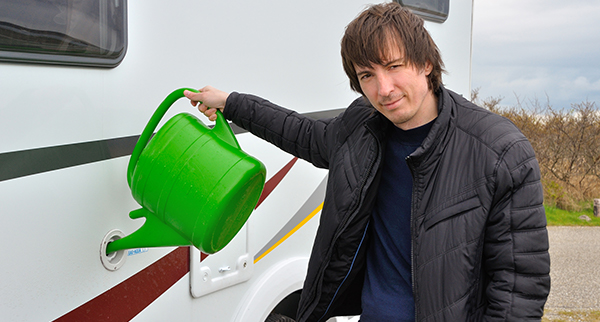It can be difficult to determine if the holding tanks in your RV are full or empty. In fact, many RVers struggle with this at first and issues with tank sensors are common. Many RVers give up after a few false readings and end up checking their tanks manually. However, there’s a simple remedy to getting your tank sensors working correctly.
Why You Need To Clean Your Holding Tank Sensors
Cleaning your RV holding tanks is important RV maintenance that cannot be avoided. Typically, your holding tank sensors should alert you when it’s time to empty the gray and black water in your tanks. If you don’t clean your tanks regularly, you will end up with buildup that will become even more difficult to clean. That buildup can prevent your tank sensors from accurately alerting you when the tanks are full and need to be emptied and cleaned.
It’s also important to make sure that your holding tanks do not overfill. Overflow of your RV’s holding tanks can get in to your shower. Overflow can also flood other parts of your RV with toxic waste. Trust us, you don’t want to deal with that happening. To prevent buildup and overflow, you need to clean your holding tank sensors annually. Once you know how to do it, cleaning your tanks is an easy task that will prevent any RV disasters from occurring.
Below are some quick steps on how to do it the right way.
How to Clean Your Holding Tank Sensors
- Drain the black water from the holding tank.
- Drain the gray water from the holding tank.
 Turn off both gray and black water valves.
Turn off both gray and black water valves.- Unscrew the drain caps on both the gray and black water tanks.
- Attach a sewer hose to the adapter of the black water tank’s drain outlet. Run the other end of the hose to the dump.
- Attach a sewer hose to the adapter of the gray water tank’s drain outlet. Run the other end of the hose to the dump.
- After you finish, place the drain cap back on both holding tanks.
- Fill both the gray and black water tanks with fresh water to the 1/3 mark found on the sensors.
- Take ½ cup dishwashing detergent and pour it into the toilet bowl.
- Take ½ cup of dishwashing detergent and pour it into the sinks.
- Flush the toilet. Run a gallon of water with each ½ cup that you poured into each sink and bowl to cleanse and rinse thoroughly. This will have cleaned out your RV’s tank sensors, too.
- After driving your RV for about an hour or so, empty both gray and black holding tanks as you did in the very first steps.
Did you complete the steps above? Then you’re set to go without any worries about your holding tanks overfilling!
Other Important RV Tips
RV maintenance is important if you want your RV to last for years to come. Below are some additional RV maintenance tips regarding cleaning your holding tanks and tank sensors.
- Don’t dump your holding tanks until they are about 2/3 full. This helps to keep the pressure high so that it drains easily without build up.
 Keep your tank valves closed until you’re ready to dump.
Keep your tank valves closed until you’re ready to dump.- Always dump black water (toilet) before dumping gray water (shower, sinks).
- Flush with lots of water whenever you dump. You can even get a back-flush system for your black water tank. After you dump, it’s not a bad idea to back flush and dump again before leaving the station.
- If your sensors are clean but they’re still saying your black water tank is full when you know it’s not, check to see if toilet paper has attached itself to the sensors (these are attached at the side of the waste tank). If toilet paper keeps sticking to your tank sensors, it may be wise to use specialty RV toilet paper instead of the regular type.
- Before storing your RV for any length of time, it’s advised that you add a couple of gallons of water to your tanks. You should also add RV holding-tank chemicals to the water so your tanks stay clean and won’t accumulate any buildup. In winter, however, you’ll have to use antifreeze to winterize your RV.
RV Insurance
You want to be covered in case your RV gets into any sticky situations or accidents. However, Specialty RV Insurance doesn’t have to be expensive to provide full coverage. Your regular Auto Insurance won’t cover your RV, but we can. Call (866) 501-7335 for a free quote and coverage that fits your lifestyle.
The information in this article is obtained from various sources. This content is offered for educational purposes only and does not represent contractual agreements, nor is it intended to replace manuals or instructions provided by the manufacturer or the advice of a qualified professional. The definitions, terms, and coverage in a given policy may be different than those suggested here. No warranty or appropriateness for a specific purpose is expressed or implied.
